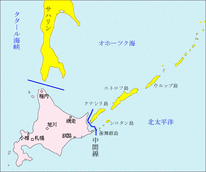 Source: ne.jp
Source: ne.jp One possible reason for this behaviour may lie in the need for President Vladimir Putin to be seen as uncompromising in Russia’s claims to the Northern Territories. Given the assurances made by former Prime Minister Dmitry Medvedev that Russia’s claims to the territory were not negotiable, being upstaged by a former deputy in the defence of Russian interests would not sit well with a figure such as Putin. Putin may also be seeking to draw Abe Shinzo out on the issue, getting him to re-assert Japan’s claims to see whether he is indeed committed to resolution or whether he is bound by the rhetoric used during the recent election campaign on Russia’s “illegal” occupation of the territory (J).
If the incursions continue, Russia may well be attempting to use Japan’s dispute with China as a further test of Japan’s alliance with the US, probing the extent to which it can provoke Japan before garnering a response from Washington. Such a strategy would also play into the hands of Putin, as it would be taken as evidence that the US was seeking to interfere in a bilateral issue that President Putin had previously sought to resolve (J).
The message from Russia could not be any clearer, given the intrusion occurred on a day marked as “Northern Territories Day” (E), in which calls are made for the return of the territories to Japanese sovereignty. Whether any progress in negotiation in made from here will depend on both sides entering talks in good faith. Given last week’s act, and Putin’s previous comments that there will be no halt to the development of the Kurile Islands, means that there will have to be an awful lot of negotiation before even an inkling of a resolution comes to light.
 RSS Feed
RSS Feed